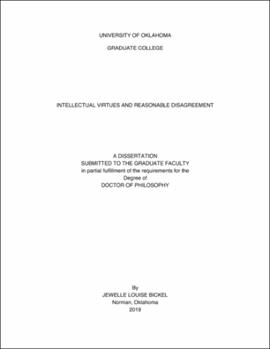| dc.description.abstract | The contemporary problem of disagreement has two prominent solutions. The Conciliationists think that after discovering a case of disagreement one should be less certain of one’s original position. Those who favor Conciliatory views tend to think that disagreement is epistemically significant because it causes problems for one’s rationality. The Steadfasters, on the other hand, think that one should maintain one’s belief in the face of a disagreement; thus, disagreement appears a less epistemically significant problem to them. But neither of these solutions address the actual problem of disagreements: that the very same faculties which cause me to trust myself provide you a differing opinion. Therefore, we need a solution for disagreement that responds to the issues it presents to one’s self-trust rather than secondary factors, like the likelihood of peerhood or the truth of the Uniqueness Thesis. Such an account ought to be regulative in nature. That is, it should offer insight to epistemic agents. The best of the regulative accounts can be found in virtue epistemology, because its practical nature is grounded in a holistic appraisal of epistemic agents. In cases of disagreement, to be epistemically virtuous, an agent needs to balance her intellectual fortitude with her intellectual humility and open-mindedness. But in order to balance these virtues when they appear to be in conflict, we need another resource that is able to govern them. For this purpose, I introduce intellectual phronesis. Like its moral counterpart, intellectual phronesis can help one to discern the particularity of situations in order to determine the appropriate response. Accordingly, intellectual phronesis is the ideal tool to adjudicate which intellectual virtue is appropriate for a particular disagreement. | en_US |
